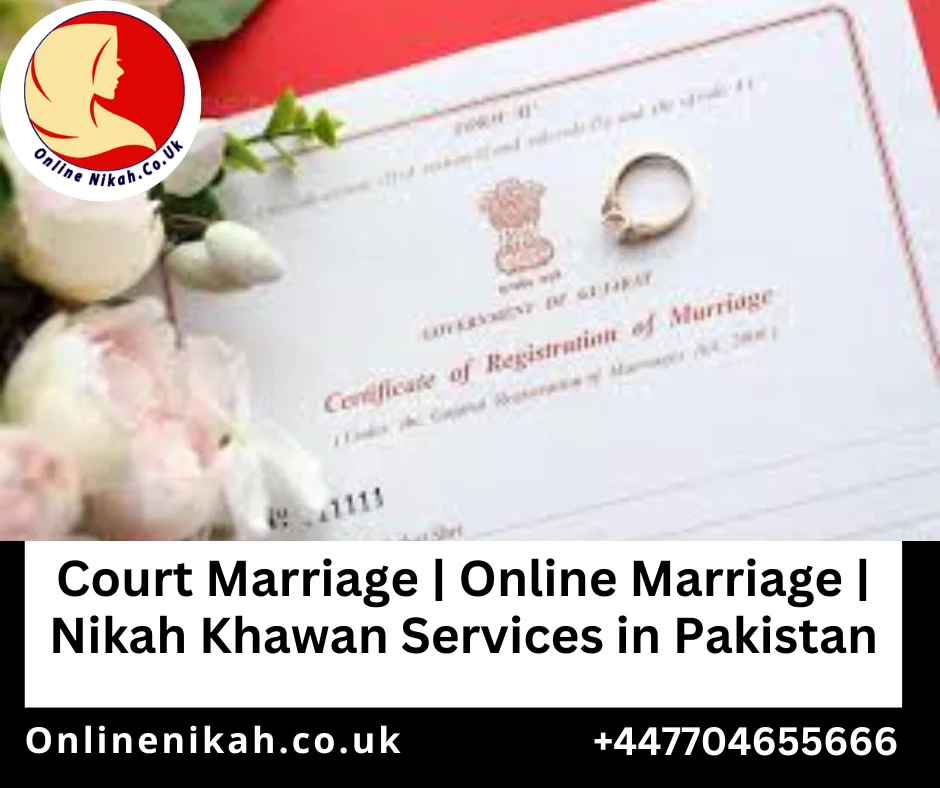- +92 333 2316871
- info@onlinenikha.co.uk
- Mon - Sun: 9:00 - 23:30
Marriage in Islam: Principles, Practices, and Cultural Significance
Marriage in Islam: A Sacred Covenant Beyond a Social Contract
Marriage in Islam holds a position of significant importance, transcending the bounds of a mere social arrangement to embody a sacred commitment known as Nikah. This marital union is seen not merely as a contractual obligation but as a profound covenant that fosters mercy, peace, and companionship between partners. It is a partnership grounded in mutual respect and shared responsibilities, serving as a cornerstone for building a stable and harmonious family structure.
Exploring the Spiritual Depth of Marriage in Islam
At its core, Muslim matrimony is designed to cultivate an environment where love and compassion can thrive. The institution of marriage is deeply rooted in Islamic teachings, which emphasize the spiritual and emotional integration of two individuals. Quranic verses and Hadiths highlight that marriage is an essential part of life, a means to maintain chastity, and to nurture human closeness and understanding. It is regarded as fulfilling half of one’s faith (“Deen”), underlining its paramount significance in a believer’s life.
The Sanctity of Marriage in Islam: A Foundation for Community Welfare
The sanctity of marriage in Islam is further underscored by its objective to provide a secure and nurturing environment for any offspring. This enhances the spiritual, emotional, and social welfare of the couple, and by extension, of the entire community. The faith-based principles embedded in the concept of marriage ensure that it is approached with earnest intentions, aiming for long-term harmony and mutual growth. The emphasis on dialogue and consent in the Nikah process manifests Islamic values of respect and equity.
Marriage in Islam: Fostering Long-Term Harmony and Mutual Growth
Therefore, in understanding marriage in Islam, one appreciates not just a cultural practice, but a profound spiritual exercise that extends beyond mere legality. It epitomizes a life-long commitment to growing together in faith, love, and mutual respect, reflecting the broader Islamic ethos of mercy and compassion.
Table of Contents


The Pillars of Nikah (Marriage Contract)
In Muslim matrimony, the concept of Nikah, or marriage, is structured upon several foundational pillars that ensure its validity and reflect Islamic values. The first pillar is the mutual consent of both parties involved. In Islam, a marriage cannot be valid without the unequivocal agreement of both the bride and the groom. This mutual consent underscores the importance of autonomy and willingness to form a marital union.
Role of Witnesses in Marriage in Islam: A Guarantee of Community Accountability
The presence of witnesses constitutes another crucial pillar of a valid Islamic marriage. Typically, two adult Muslim witnesses are required to attest to the marriage contract. This requirement serves multiple functions, including providing social recognition of the union and ensuring transparency within the community.
Marriage in Islam: The Significance of Mahr as a Marital Gift
The stipulation of the Mahr, or marital gift, is a significant third pillar in Islamic marriage. The Mahr is a mandatory gift that the groom presents to the bride as part of the marriage contract. It symbolizes respect, responsibility, and the groom’s commitment to his future wife. The amount and nature of the Mahr are agreed upon by both parties and can vary widely, reflecting cultural and individual preferences.
Flexibility of Roles in Marriage in Islam: A Foundation of Mutual Respect
Beyond these essential elements, the Nikah also outlines the roles and responsibilities of both spouses. These roles, while flexible to accommodate personal circumstances, generally emphasize mutual respect, kindness, and support. The groom is typically expected to provide for the family’s financial needs, while the bride’s primary role traditionally includes managing the household. However, these roles can be negotiated and adapted to fit the couple’s unique situation.
Rights and Responsibilities of Spouses in Islam
Marriage in Islam, often regarded as a sacred covenant, encompasses certain rights and responsibilities for both husbands and wives, establishing a foundation of balance and mutual respect. Financial responsibilities are significant in Muslim matrimony, where the husband typically assumes the role of primary provider, ensuring the family’s sustenance and well-being. This obligation is underscored by Quranic injunctions mandating that men must support their wives financially, thus securing the economic stability of the household.
Balancing Domestic Duties and Personal Aspirations in Marriage in Islam
Conversely, wives in Islam are entrusted with the domestic sphere, managing household affairs and nurturing the family. While their primary duties revolve around homemaking and childcare, it is essential to recognize that Islam grants women the freedom to work and pursue individual aspirations, provided it does not clash with familial responsibilities. The essence of these roles lies in mutual respect and cooperation.
Understanding the Domestic Role of Wives in Marriage in Islam
Faithful companionship forms the core of Muslim matrimony, emphasizing loyalty and devotion. Both spouses are expected to exhibit unwavering faithfulness to each other, fostering a sense of security and trust. Moreover, Islam advocates for shared duties and equitable participation in family life. While specific roles are delineated, the overarching principle is one of partnership and complementarity, not hierarchy.
Wives in Marriage in Islam: Nurturing Family and Home
Communication, compassion, and empathy are critical components in the marital relationship, as highlighted by the teachings of the Quran and Hadith. Effective communication aids in resolving conflicts and fostering a deeper understanding between spouses. The Quran encourages spouses to treat each other with compassion and kindness, emphasizing that a nurturing environment is pivotal for a harmonious union. Empathy, meanwhile, allows spouses to appreciate and cater to each other’s emotional and psychological needs.


Understanding Spousal Duties in Marriage in Islam: A Partnership of Support
Ultimately, these principles outlined in Islamic texts are designed to promote a balanced and fulfilling marital relationship. By adhering to these guidelines, spouses can cultivate a marriage that not only thrives on mutual respect and shared responsibilities but also adheres to the spiritual tenets that underpin Muslim matrimony.
Cultural Practices and Variations in Muslim Matrimonies
Marriage in Islam, while rooted in core religious teachings, is celebrated with a rich tapestry of cultural diversity across the globe. Regardless of geographical location, Muslim communities have developed unique matrimonial customs and traditions that blend cultural heritage with Islamic principles. This fusion creates varied expressions of joy and unity during Muslim weddings.
Marriage in Islam: The Vibrant Festivities of Mehndi and Barat in Pakistan, India, and Bangladesh
In South Asia, particularly in countries like Pakistan, India, and Bangladesh, Muslim matrimony often includes several days of festivities. One prominent tradition is the ‘Mehndi’ ceremony, where intricate henna designs are applied to the bride’s hands and feet. This event is coupled with music and dance, reflecting the vibrant cultures of the region. Another essential aspect is the ‘Barat,’ where the groom arrives at the wedding venue in a grand procession, often accompanied by family and friends.
Marriage in Islam: The Role of Sarakuna Leaders in African Muslim Marriages
African Muslim communities also showcase their rich customs through marriage ceremonies. In Nigeria, for instance, the ‘Kamu’ ceremony is a pre-wedding event where the bride is formally unveiled to the groom’s family. Similarly, the ‘Sarakuna’ leaders play a pivotal role in officiating marriages, ensuring that the union aligns with Islamic principles.
Marriage in Islam: Celebrating the Walima in Egyptian and Saudi Traditions
The Middle East, particularly in countries like Egypt and Saudi Arabia, emphasizes a blend of Islamic traditions with cultural nuances. The ‘Katb Al-Kitab’ is a formal signing of the marriage contract and an essential part of the wedding ceremony. Following this, the ‘Walima’ or marriage banquet is held to celebrate the union with friends and families, emphasizing hospitality and communal joy.
Marriage in Islam: Understanding the Akad Nikah Ceremony in Southeast Asia
In Southeast Asia, Malaysia and Indonesia offer distinct matrimonial practices. The ‘Akad Nikah’ is the formal religious ceremony conducted according to Islamic guidelines, while the ‘Bersanding’ ceremony, often held at the bride’s home, symbolizes the couple’s seated together as a newlywed pair, signifying their union to the community.
Marriage in Islam: How Akad Nikah and Bersanding Reflect Southeast Asian Traditions
While these examples highlight the diverse customs in Muslim matrimony, the common thread that unites these cultural practices is their alignment with the core tenets of Islam. The emphasis on mutual respect, love, and commitment is foundational to these varied celebrations, demonstrating that despite cultural differences, the essence of Muslim marriage remains universally cherished.
The Role of Walis (Guardians) and Matchmakers in Islam
In the context of Muslim matrimony, the role of walis, or guardians, is fundamentally significant. The wali—usually a male relative such as a father or brother—acts as the protector and advisor for the bride, ensuring that her interests are safeguarded throughout the marriage process. The consent of the wali is a crucial aspect of the marriage contract, offering a layer of safety and mutual respect, particularly for the bride. This consent symbolizes familial support and the collective responsibility towards the union, reflecting the community’s cohesive nature.


Marriage in Islam: How Traditional and Modern Matchmakers Facilitate Unions
Matchmakers also play a critical role in facilitating marriages within the Muslim community. Their primary duty is to bring suitable candidates together, considering factors such as compatibility, shared values, and communal ties. Traditional matchmakers, often trusted elders or religious figures, employ their experiential wisdom and social networks to introduce potential spouses, aiming to foster solid and enduring marital relationships. In recent times, professional matchmakers and digital platforms have also become prominent, offering modern tools while maintaining the core values and principles intrinsic to Muslim matrimony.
Marriage in Islam: How Contemporary Practices Blend with Traditional Roles
While the traditional roles of walis and matchmakers are deeply embedded in Islamic culture, there is an evolving balance with contemporary practices. Modern approaches increasingly recognize the autonomy of individuals, allowing prospective couples to have a significant say in the selection process, while still valuing the involvement and guidance of their guardians. This blend of tradition and modernity ensures that the sanctity and essence of marriage in Islam are preserved, even as societal norms evolve.
Ultimately, the responsibilities and influence of walis and matchmakers are integral to the orchestration of a marriage that not only adheres to Islamic principles but also seeks to establish a union based on mutual respect, shared values, and familial harmony.
Marriage Preparation and Premarital Counseling in Islam
In Islam, the institution of marriage is a sacred covenant that entails significant preparation, encompassing both spiritual and practical dimensions. Before matrimony, prospective couples need to engage in comprehensive preparations. These preparations often include premarital counseling, which serves to equip individuals with the tools needed to navigate the complexities of marital life. Premarital counseling sessions are commonly facilitated by knowledgeable Islamic scholars or licensed counselors who guide various aspects of marriage.
Marriage in Islam: Evaluating Faith and Character in the Spousal Selection Process
Such counseling helps couples assess compatibility, addressing pivotal topics such as faith, character, mutual goals, and family dynamics. One fundamental aspect of Muslim matrimony is the consideration of faith and piety. In Islam, it is encouraged to select a spouse whose faith and values are aligned with one’s own, fostering a harmonious relationship rooted in shared religious principles. Additionally, evaluating each other’s character is paramount, as virtues such as honesty, patience, and respect significantly contribute to a successful marriage.
Marriage in Islam: Counseling for Compatibility—Faith, Character, and Mutual Goals
Understanding and aligning on mutual goals is another critical facet of marriage preparation. Couples are encouraged to discuss their aspirations and plans for the future, examining how they can support each other in achieving these objectives. Open communication about financial management, career goals, and family planning can significantly diminish potential sources of conflict and enhance marital harmony.
Marriage in Islam: Merging Families and Navigating Family Traditions
Furthermore, the importance of understanding family dynamics cannot be overstated. In many Muslim cultures, marriage is not merely a union of two individuals but a merging of families. Prospective couples should acquaint themselves with each other’s family traditions, values, and expectations, fostering a sense of mutual respect and cooperation. By doing so, they can better navigate the interconnected relationships that inevitably play a crucial role in their married life.


Marriage in Islam: The Role of Shared Values and Open Communication in Marriage Preparation
The holistic approach to marriage preparation in Islam underscores the significance of building a strong foundation based on shared values, mutual understanding, and open communication. As couples embark on the journey of wedlock, these preparations pave the way for a fulfilling and harmonious marriage, deeply rooted in the principles of Islamic faith and practice.
Challenges and Conflict Resolution in Islamic Marriage
Marriage in Islam, like in any other context, can face a myriad of challenges. Common issues such as financial stress, communication breakdowns, and differing expectations can create tension between spouses. Recognizing and addressing these conflicts is vital to maintaining a harmonious relationship in Muslim matrimony.
Marriage in Islam: How Preparation Enhances a Fulfilling and Principled Marriage
Patience and forgiveness are fundamental virtues that play a significant role in resolving marital disputes. Islam teaches that spouses should be patient with one another, especially during times of hardship, and should seek to overlook minor faults. This approach helps in calming tensions and promoting understanding. Forgiveness, another cornerstone of Islamic teachings, encourages partners to let go of grievances and work towards a sustainable resolution.
Marriage in Islam: Building a Strong Foundation Through Shared Values and Communication
Seeking advice from trustworthy and knowledgeable individuals or counselors is also encouraged in Islam. Family members, community leaders, or trained counselors who have a profound understanding of Islamic principles can provide valuable guidance. Their insights, based on experience and scriptural understanding, can help couples navigate through their difficulties more effectively.
Marriage in Islam: The Impact of Mutual Understanding and Islamic Faith on Marriage Preparation
Mediation, an essential component of conflict resolution, is embedded in Islamic tradition. The use of mediators, or arbitrators, from each partner’s family can facilitate constructive dialogue and ensure that both parties are fairly represented. This method is supported by Quranic principles, which advocate for balanced and just mediation in resolving disputes.
Marriage in Islam: Applying Quranic Guidance to Address Marital Issues
Employing Quranic principles and Hadith is crucial for identifying appropriate solutions to marital conflicts. The Quran and Hadith provide comprehensive guidelines on marital conduct, emphasizing mutual respect, kindness, and equity. Through adherence to these teachings, couples can find the guidance needed to address and resolve their issues in a manner that aligns with Islamic values.
The Essence of a Successful Islamic Marriage
The foundation of a successful marriage in Islam is deeply rooted in mutual respect, understanding, and strict adherence to Islamic teachings. The principles set forth by the Qur’an and the Hadith guide Muslim couples toward a harmonious and fulfilling marital relationship. These teachings emphasize the importance of love, compassion, and cooperation between spouses.
Marriage in Islam: The Essential Role of Respect in Developing a Meaningful Marriage
Mutual respect forms the cornerstone of any successful relationship, and marriage is no exception. When spouses treat each other with dignity and respect, they create an environment of trust and support. Understanding each other’s perspectives, needs, and aspirations fosters a deeper connection that goes beyond mere companionship.
